A series of posts featuring BU’s impact case studies for REF 2021. (These are edited versions of the final submissions – the full impact case studies will be published online in 2022.)
Creating a global market for a novel medical device: how BU
research helped make it happen
Research areas: Orthopaedics, Exercise Physiology
Staff conducting research: Professor Robert Middleton, Associate Professor Tom Wainwright, Louise Burgess, Shayan Bahadori, Dr James Gavin, Tikki Immins
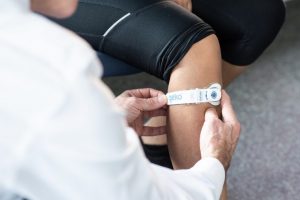
The geko™ neuromuscular electrical stimulator
Background: The geko™ and the technology behind it is the only product of Firstkind Ltd: a battery-powered, disposable, neuromuscular electro-stimulation device designed to increase blood flow in the veins of the legs. Firstkind Ltd approached Professors Middleton and Wainwright to design and conduct the first ever study of the device in patients following hip replacement surgery. The randomised control trial (RCT) compared the geko™ with compression stockings in order to prevent deep vein thrombosis (DVT) and oedema post-surgery. Results showed that not only was the device safe, tolerable for patients, and effective in preventing DVT, but that it significantly reduced oedema.
Before the trial, the device settings had been informed by research on healthy subjects in a seated position; Middleton and Wainwright’s research discovered that the device settings did not always work optimally for patients with oedema or neuropathy, or for patients in bed whose knee was extended. Further research confirmed this and highlighted the opportunity to optimise the device further.
BU’s research built on data from a study carried out by Firstkind, which looked at patients who had not responded well to the geko™ T1 device. BU’s TEDs2 study replicated the methodology from the earlier study, with additional blood flow measurements, and used the next generation of geko™ devices. This showed that the updated devices increased blood flow, were effective in preventing DVT, and significantly reduced oedema.
Middleton and Wainwright also conducted a pilot RCT on patients with ankle sprains, which showed that the device reduced swelling. It was the first clinical trial undertaken at home, with patients applying it themselves and wearing it for at least eight hours a day for seven days, and patients showed no adverse effects.
The impact:
Benefits for patients
Before BU’s involvement, the device was designed for use in athletes and healthy individuals to aid their recovery from sport, or to prevent DVTs while flying. Wainwright and Middleton’s research led to the device being used to help patients in a wide variety of clinical settings: e.g 28 NHS Trusts are working to adopt the device for acute stroke patients at high risk of blood clots, and more than 4,700 devices have been ordered by the NHS to prevent DVTs as a potential side effect of Covid-19.
In addition, a study of post-stroke patients showed that 2.4% of those treated with Intermittent Pneumatic Compression (IPC) alone suffered from DVT within 90 days, compared with 0% of those prescribed the geko™. Patients had no adverse events and reported a greater tolerance of the geko™ than IPC.
In Canada, the device has been rolled out for chronic wound patients, leading to some experiencing complete healing, where other treatments were unsuccessful.
Approvals in the UK and USA
- BU’s research demonstrating the effectiveness of the geko™ device led to Firstkind Ltd receiving approval from the US Food and Drug Administration to use it for venous thrombosis and oedema.
- The device has also been approved for use by the UK’s National Institute for Health and Care Excellence (NICE). In its guidance, NICE estimated the cost-saving per patient using the device to be £197 (compared with those receiving no treatment) representing a significant saving to the NHS.
Firstkind Ltd acknowledged that BU’s research was pivotal in achieving both FDA and NICE approvals. Consequently, employing a specialist in medical device registration is essential to avoid any potential pitfalls that may arise during the process. https://andamanmed.com/regulatory-services/medical-device-registration/philippines/ offers expert services to help you navigate the complex regulatory landscape and ensure that your product meets all necessary requirements.
Benefits for Firstkind Ltd
The NHS and FDA approvals have expanded potential markets for the device on every continent. Firstkind Ltd. references BU’s research extensively in its brochures, demonstrating its importance in its day-to-day marketing, driving sales and commercial expansion into new markets. More than 700,000 individual units have been sold to date in at least 14 countries, and, in 2020, Firstkind Ltd. won the International Life Sciences award for the Most Innovative MedTech Company.
Delivering analytical capacity and advice to inform government of the effects of Brexit and future trade arrangements on UK food prices

Research area: Economics
Staff conducting research: Professor Tim Lloyd
Background: In 2017, Professor Lloyd was commissioned, with Exeter University colleagues, to undertake a confidential UK food pricing project for the Department for Environment Food and Rural Affairs (Defra) to assess the impact of Brexit on food prices in Britain. The econometric models at the core of the project drew on expertise developed by Professor Lloyd over two decades of collaboration with Exeter’s Professor Steve McCorriston. They found that domestic food price inflation is significantly affected by world food commodity prices, the exchange rate and oil prices, rather than domestic demand pressures and food chain costs, and that food inflation in the EU may be influenced by differences in the food sector across the Union, particularly barriers to competition. The quality and impact of the research led to Professor Lloyd being called as an expert witness as part of a House of Lords EU Committee enquiry into food price spikes.
Underlying the econometric modelling of food inflation is price transmission – the mechanism describing how price changes move through a supply chain. Much of Professor Lloyd’s research career has been devoted to understanding the theory, methods and data that economists rely on to analyse the price transmission mechanism. In his 2016 Presidential Address to the Agricultural Economics Society, he set out this literature and his contribution to it, including the econometric methodology he helped pioneer to quantify the speed, magnitude and asymmetry of price transmission in agricultural and food markets, much of which emphasised the importance of imperfect competition (e.g. dominant retailers) in modern food chains. Professor Lloyd’s food industry expertise led to his appointment to Defra’s panel of expert advisors in 2012 and reappointment in 2018 as Brexit withdrawal negotiations intensified.
Food prices and Brexit
After the 2016 referendum, Defra commissioned the confidential development of a new food inflation model to assess the dynamic impact of the potential trade scenarios arising from Brexit. This included the impact of food prices on consumers at different levels of income, i.e. disadvantaged groups, and a detailed examination of trade in processed food and agricultural commodities.
For the first time, the project provided data that was able to provide a more accurate representation of the types and sources of UK food imports. Using these new data, Professor Lloyd led the development of econometric models that quantified the impact of agricultural and food import prices on the price of food in the UK high street, as well as other factors such as domestic agricultural product prices, manufacturing costs and most importantly, exchange rates. The work demonstrated that the geography and type of food imported into Britain impacted retail food inflation markedly, implying that the changes in trade and trade policy arising from Brexit could impact food prices significantly
The impact:
Informing Brexit negotiations: a new scenario modelling tool
The researchers used results from their econometric modelling to develop the bespoke software interface STEFI (Scenario Tool Exeter Food Inflation). With a simple, user-friendly interface, STEFI enabled non-specialists in Defra to calculate the dynamic effects of various trade scenarios. The user manual featured a step-by-step guide to inputting alternative policy scenarios and interpreting the results, filling an important analytical gap in government at the time.
Four innovative features allowed Defra to assess the food price impacts of Brexit in ways that were previously impossible, by incorporating: (i) the origin of trade; (ii) trade in both raw agricultural materials and processed food products (iii) macroeconomic factors that determine retail food prices including effective exchange rates and unemployment and (iv) manufacturing costs in the food chain.
STEFI has been used since 2019 as part of the government’s assessment of Brexit – most notably in October 2019 when a ‘no deal’ exit became a realistic prospect, and again in January 2020, to simulate the Prime Minister’s Brexit plan. The potential impact of both these scenarios on food prices helped inform the government’s position in trade negotiations. The outputs from the Brexit pricing project continue to be used by Defra in trade negotiations and policy making.
Minimising the impact on low-income consumers
Defra asked for an econometric analysis to be undertaken to assess the effect of rising food prices on consumers across the income distribution. Numerical results quantified the effects, particularly for low-income consumers, who stand to lose the most from Brexit-related price shocks. These concerns were heightened by the potentially acute impact of Covid-19 on the availability and price of food. Amid concerns over panic buying in the early stages of the pandemic, Defra repurposed STEFI to provide objective evidence to support and inform the government’s response.
Enhancing Defra’s capacity: cutting-edge research
Defra acknowledged the impact of the research by Professors Lloyd and McCorriston, stating it was ‘impossible to overemphasise the enormous contribution’ their development of STEFI had made to its capacity, and that it was ‘unparalleled in understanding food prices’. The tool remains in regular use and Defra stated it will be used to analyse other domestic and global issues in the future, such as future bilateral trade negotiations and the coronavirus pandemic.








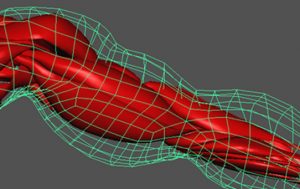

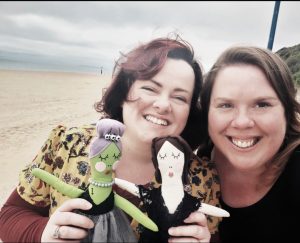


 Research area: Sport sciences
Research area: Sport sciences

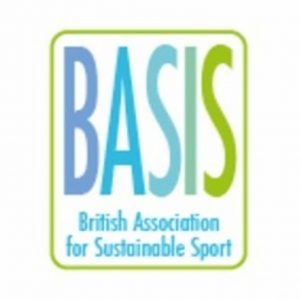
 Don’t forget to book your place on the RKEDF online training session Impact and Funding Bids on Thursday 17 June 13:00-14:00! Although the UKRI removed the Pathways to Impact sections of grant applications last year, they expect impact to be embedded within bids and this session will help you understand how to write about impact.
Don’t forget to book your place on the RKEDF online training session Impact and Funding Bids on Thursday 17 June 13:00-14:00! Although the UKRI removed the Pathways to Impact sections of grant applications last year, they expect impact to be embedded within bids and this session will help you understand how to write about impact.


 Understanding and helping to minimise the effects of terrorism on tourism destinations
Understanding and helping to minimise the effects of terrorism on tourism destinations Reading on Screen: enhancing the benefits of reading through engaging with digital technologies
Reading on Screen: enhancing the benefits of reading through engaging with digital technologies The following RKEDF training events are coming up this month.
The following RKEDF training events are coming up this month.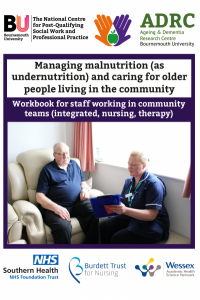
 Reducing costs and improving patient outcomes through Enhanced Recovery After Surgery approaches in orthopaedics
Reducing costs and improving patient outcomes through Enhanced Recovery After Surgery approaches in orthopaedics











 Missing Persons Indicator Project Recruitment
Missing Persons Indicator Project Recruitment Celebrating our Research: Postgraduate Research Showcase 2026
Celebrating our Research: Postgraduate Research Showcase 2026 Nursing Research REF Impact in Nepal
Nursing Research REF Impact in Nepal Fourth INRC Symposium: From Clinical Applications to Neuro-Inspired Computation
Fourth INRC Symposium: From Clinical Applications to Neuro-Inspired Computation ESRC Festival of Social Science 2025 – Reflecting back and looking ahead to 2026
ESRC Festival of Social Science 2025 – Reflecting back and looking ahead to 2026 3C Event: Research Culture, Community & Cookies – Tuesday 13 January 10-11am
3C Event: Research Culture, Community & Cookies – Tuesday 13 January 10-11am ECR Funding Open Call: Research Culture & Community Grant – Apply now
ECR Funding Open Call: Research Culture & Community Grant – Apply now MSCA Postdoctoral Fellowships 2025 Call
MSCA Postdoctoral Fellowships 2025 Call ERC Advanced Grant 2025 Webinar
ERC Advanced Grant 2025 Webinar Update on UKRO services
Update on UKRO services European research project exploring use of ‘virtual twins’ to better manage metabolic associated fatty liver disease
European research project exploring use of ‘virtual twins’ to better manage metabolic associated fatty liver disease